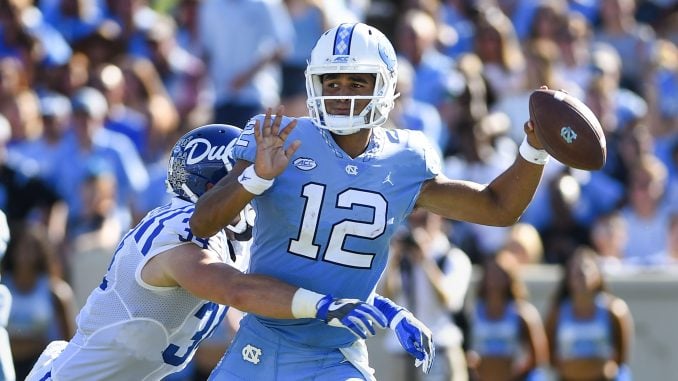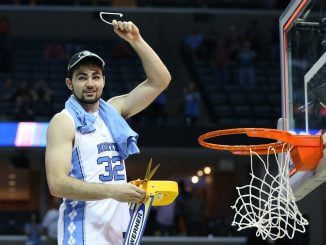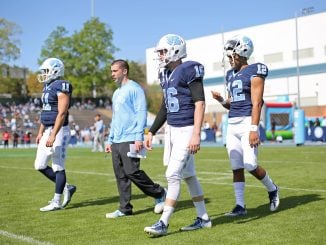
CHARLOTTE — If there’s a silver lining to the dark cloud that hovered over the North Carolina football team during an injury-riddled 2017 season, defensive tackle Aaron Crawford said it’s the lessons he and his teammates learned about dealing with adversity.
“Everything good and bad that happens to you in life, there’s a lesson to be learned,” Crawford said at the ACC’s Football Kickoff media event last week. “Obviously this was a major lesson in how we carry ourselves because we saw week after week, things weren’t going as planned.”
If, in fact, the Tar Heels did take something positive away from their disappointing 3-9 season, it won’t take long for them to put the lessons learned to practical use.
That’s because it’s likely they’ll be shorthanded again to start the new season, with as many as a dozen players facing possible suspensions for selling school-issued shoes and other athletic gear. UNC self-reported the secondary NCAA violations last spring and is awaiting a ruling on the situation. The players involved have not yet been named.
Whatever the decision turns out to be, the distraction is the last thing coach Larry Fedora needed after a season in which everything that possibly could go wrong did go wrong for his program.
In all, the Tar Heels lost 17 players, including nearly their entire receiving corps, to season-ending injuries, forcing Fedora to use numerous young replacements before they were ready.
But as much as injuries played a role in halting the momentum UNC had built by winning 18 games and a Coastal Division title over the two previous seasons, Fedora insists that it wasn’t the only reason for the drop-off.
It’s a point illustrated by close losses to eventual Coastal champion Miami and rival NC State among others, games in which the Tar Heels were unable to hold onto leads heading into the fourth quarter.
Fedora is hoping the experience gained by young players such as quarterbacks Chazz Surratt and Nathan Elliott, running back Michael Carter, wide receiver Beau Corrales, offensive lineman Jay-Jay McCargo and defensive backs Myles Woolfolk and Tre Shaw will help this year’s team avoid such late-game problems.
Just in case, he and his staff spent a considerable amount of time this offseason trying to figure out what went wrong and how to keep the same mistakes from happening again.
“You don’t forget it,” Fedora said. “You make sure when you’re in those situations that you’re learning from those situations. It wasn’t sit around and go, ‘woe is me’ all last season. It was, ‘Why did it happen? Why did we not overcome it? How do we overcome them next time?’”
Even after all that introspection, Fedora said he’s still at a loss to explain why so many players went down with injuries last season.
Nevertheless, he plans on making a number of subtle changes to the way he prepares his team for the coming season in hopes of avoiding a similar epidemic. Though he didn’t go into specifics, he suggested that a greater emphasis would be placed on rest and recovery than in the past.
“I learned that it wasn’t one common denominator,” he said of the injuries. “It wasn’t the field conditions, it wasn’t the actual training we were doing. It was a variety of things, so we’re going to tweak some things. And I can’t guarantee that’s going to be the answer. But we’re going to make the best educated decision we can. I’m going to make that decision and live with it.”
That, however, probably won’t be the most important — or difficult — decision Fedora has to make in the weeks leading up to the season opener at Cal on Sept. 1.
The choice will come down to either Surratt, a former national high school Player of the Year who started seven games as a redshirt freshman last season, and Elliott, a less-heralded, less-mobile sophomore who won two of his three starts to finish the year.
Both had comparable statistics, with Surratt completing 58.5 percent of his passes for 1,342 yards, eight touchdowns and three interceptions and Elliott hitting on 51.4 percent of his throws for 925 yards, 10 scores and five picks.
Although their play during preseason camp will determine which wins the job, at least to start the season, leading receiver Anthony Ratliff-Williams said it doesn’t matter which ends up under center thanks to the lessons they learned during last year’s on-the-job training.
“I feel that both quarterbacks bring their own (qualities) to the game,” Ratliff-Williams, a former quarterback himself, said. “I don’t really prefer either one. I just let those guys play their game and do what they do. They give me the ball, give anybody the ball when needed. I feel like they’re taking the time in the summer to compete and show which one is a better guy. We’re going to win with either one.”



